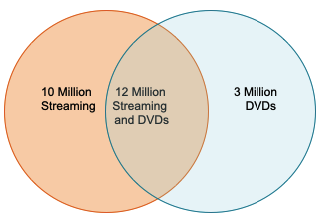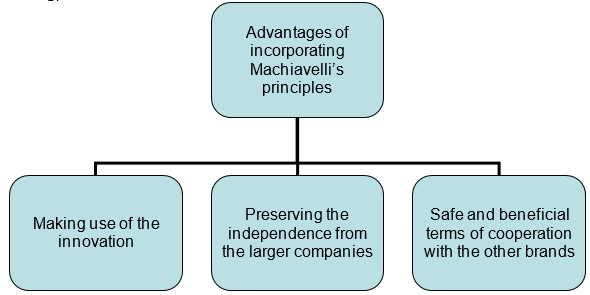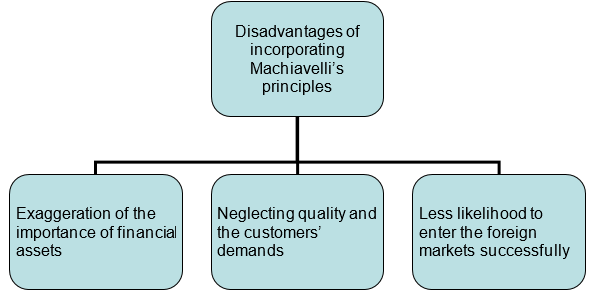Executive Summary
The report is to provide the analysis of Netflix’s strategy from the perspective of Niccolo Machiavelli’s ideas expressed in his work The Prince. Even though Machiavelli developed his doctrine for the use in the sphere of politics, similar principles can be easily applied in business and marketing.
Considering the differences between the modern business context and the epoch contemporary to Machiavelli, the main objective of the report is to define the advantages and disadvantages of using the philosopher’s ideas for the strategic management of a modern-day company. To provide the analysis, the report is to examine the aspects of business strategy, in which Netflix adhere and eschew Machiavellian ideas.
The former include manifesting the importance of innovation, the correlation between Netflix’s customer appeal and Machiavellian understanding of keeping integrity, ad collaboration with other brands following the Machiavellian principle of avoiding neutrality. Notwithstanding the foregoing, Netflix does not share the strategic approach with Machiavelli’s doctrine in terms of strategies for entering new markets and managing the competition with the other companies.
Overall, the analysis shows that there are some pros and contras in adhering to the Machiavellian doctrine in modern circumstances. On one hand, the incorporation of the innovative strategies helped Netflix to find their niche on the market, and keeping the accurate distinction between the rival companies and the potential partners ensured the successful collaboration for Netflix with the other brands. On the other hand, the variety of customized genres that Netflix offers can be interpreted as a lack of integrity.
Introduction
The Prince is one of the most well-known works by Niccolo Machiavelli. Although it was initially written as a treatise for the governors and policymakers, Machiavelli’s doctrine can be incorporated into the other media of human activities.
While in the political context, the concept of Machiavellian strategy is associated with authoritative policies, there is room for the application of Machiavelli’s ideas in the context of the corporate environment. The reason for that is the fact that a company or a corporation acts within the business environment, in the same way as a politician governs a state.
Furthermore, if the company is perceived as a single organism, it is more likely to have an integrated structure and consistent strategy. In some ways, we can see the correlation between some of the approaches used by Netflix and the principles described by Machiavelli.
However, they are significantly adapted to the specifics of the modern environment, including the plurality of the market choice and the means of rivalry between the different companies. It is also important to point out that those Machiavellian ideas are used by Netflix to great advantage.
Conversely, because of the historical changes and different values of modern society, a number of the principles suggested by Machiavelli potentially can have negative consequences for managing the corporation. Overall, there are distinct advantages and disadvantages of Netflix’s strategy in comparison to Machiavellian doctrine.
Netflix’s adherence to the ideas of Niccolo Machiavelli
The importance of innovation
Machiavelli claims that some rules imposed on the governors restrict their potential to use the new strategies. The philosopher suggested that “innovators can rely on themselves or have to depend on others” (Machiavelli 17).
Regarding the managerial and business strategies, it would mean that those who want to introduce an entirely new concept to the market have two choices as well. They can either suggest those ideas to the other companies or incorporate them themselves. Also, according to the Machiavellian doctrine, only the latter is a worthy option.
In many ways, the original idea behind Netflix was a DVD renting serving and streaming service that only required a subscription fee. Such a concept revolutionized the industry of DVD renting per mail since the structure of the service was completely different, which corresponds to the Machiavelli’s aphorism “it much assists a prince to set unusual examples in internal affairs” (Machiavelli 57). Thus, due to the new policy that relied mainly on profits from the subscriptions, Netflix managed to obtain 25 million subscribers in the United States only (Frommer par. 3).
Nevertheless, it raised the accusations that there are 10 million online streaming-only subscribers compared to only 3 million DVD-only subscribers, which can be interpreted as a decline in the DVD per mail service popularity.
However, in total among the 25 million subscriptions, there are also 12 million of those, who subscribed for both the DVD shipments and online video streaming services (Frommer par. 5). The following Venn diagram represents the distribution of the 25 million of the US Netflix subscribers.

The data represented in the diagram proves that Netflix’s innovative strategy of subscription-based service that did not require charges for the amount of the material streaming was successful because it was implemented within one company without external support.
One of Netflix’s main features that distinguish it from the other video streaming services is the system of the customized genres. With the help of various means of examining the customers’ preferences, Netflix developed a system of over 76,000 genres available online.
The idea of using the customers’ very specific demands agrees with Machiavellian doctrine. According to Niccolo Machiavelli, “the nature of the people is variable, and whilst it is easy to persuade them, it is difficult to fix them in that persuasion, and thus, it is necessary to take such measures that, when they believe no longer, it may be possible to make them believe by force” (Machiavelli 17). In the context of modern marketing, such an approach can be modified as the necessity to provide a wide range of choices for the customers. Netflix does not invest a lot in advertising but provides the content adequate to the customers’ demands. The main reason for that being that it can be easier to offer the customers the content they want then to persuade them to be interested in something else.
Collaboration with other brands and the Machiavellian principle of avoiding neutrality
Netflix and Marvel, Inc. started to work together to create four Netflix shows in 2013. Although Netflix did not have a lot of collaborative projects over the years, the partnership was quite successful. Hence, it would be a good strategy for Netflix to extend the approach of collaboration with the other brands to the international level and to produce the content with the consideration for the regional demands (Greer 250).
From the Machiavellian perspective, “a prince is also respected when he is either a true friend or a downright enemy, that is to say, when, without any reservation, he declares himself in favor of one party against the other; which course will always be more advantageous than standing neutral” (Machiavelli 57).
In the case of Netflix, since the company chose to establish cooperation with Marvel, they neither bought in nor produced any content related to the Marvel’s rivaling companies, or as Machiavelli suggests, “he who conquers does not want doubtful friends who will not aid him in the time of trial” (Machiavelli 57).
Since the firm does not follow strict neutrality with the cooperating companies, the competitors should not be treated neutrally either. In the industry of video streaming services, the environment is quite competitive, and Netflix reasonably avoids cooperation with the rival companies, such as Amazon.com, Inc.
The ideas of Nicollo Machiavelli eschewed by Netflix
Entering new markets and Machiavelli’s ideas on controlling principalities
In chapter V of The Prince, Machiavelli discusses the principles of how to regulate and control new territories. The philosopher suggests that “he who becomes master of a city accustomed to freedom and does not destroy it, may expect to be destroyed by it, for in rebellion, it has always the watchword of liberty and its ancient privileges as a rallying point, which neither time nor benefits will ever cause it to forget” (Machiavelli 15). In other words, the philosopher promotes the imposition of the values of the new territories.
Until recently, it could have been suggested that the approach agreed in some ways with the international marketing strategy for Netflix. However, it was proved unsuccessful, and, therefore, the company tries gradually to establish a new platform for the international market.
Competing with other companies and Machiavellian perspective of the governance in new principalities
Considering the historical context, Machiavelli’s suggestion that fortune manifests itself as the major influence of success can be valid for his time. Even when talking about political leadership, the philosopher claimed that “he who has relied least on fortune is established the strongest” (Machiavelli 16).
Some claims may seem inconsistent with Machiavelli’s support for innovative approaches. For example, he states that “a wise man ought always to follow the paths beaten by great men, and to imitate those who have been supreme” (Machiavelli 16). However, this statement mainly concerns the financial aspect. Machiavelli believed that financial resources would be a more important asset in any initiative. He compared those who compete with the opponents with more resources to the archers, who “knowing limits to which the strength of their bow attains, take aim much higher than the mark” (Machiavelli 16).
Notwithstanding the foregoing, Netflix managed to succeed in the market of the video streaming services, despite having such opponents as Amazon.com, Inc, Hulu.com, Inc, etc., whose financial assets exceeded Netflix’s resources. For that reason, it is sensible to say that the ultimate reliance on financial capital does not belong to the advantages of using the Machiavellian principle in the modern business environment.
Moreover, Machiavelli claims that “it is unnecessary to have all the good qualities, but it is very necessary to appear to have them” (Machiavelli 46). Since the customer appeal of the different video streaming companies relies on the different offers, policies, and systems of charge, it would not be reasonable to suggest that details of the service are irrelevant. Hence, insufficient quality would immediately affect the company’s performance. In the framework of Netflix’s strategy, it concerns the fact that the quality content, alongside the convenient usability, was among the first factors to ensure the company’s success (Greer 14). Therefore, Machiavellian opinion on the unimportance of the genuine quality would be disadvantageous for the business today.
Advantages and disadvantages of the manifestation of Machiavelli’s ideas
Although some of Netflix’s strategic decisions seemed unique at the time, there are some parallels with the doctrine suggested by Niccolo Machiavelli. For instance, due to the incorporation the innovative strategies, Netflix found its niche on the market. Meanwhile, keeping the accurate distinction between the rival companies and the potential partners ensured the successful collaboration for Netflix with the other brands, including the most famous cooperation with Marvel Inc. The following structural diagram represents the advantageous results of the inclusion of Machiavellian principles into Netflix’s managerial strategy.

However, because of the differences between the historical and ideological context of modern society and the epoch, in which The Prince was written, there are some disadvantages of using the Machiavellian approach. Thus, the following structural diagram attempts to represent the possible disadvantages of Machiavellian principles for Netflix’s managerial strategy.

Reliance on the financial assets and ‘conquering’ strategy overseas would hinder Netflix to enter some of the international video streaming markets, which is a prerogative for the company at the current stage. From a Machiavellian perspective, the variety of the customized genres that Netflix offers can be interpreted as the lack of integrity and unnecessary efforts. However, in reality, superficial quality and lack of the structure behind it would damage the major customer appeal of Netflix.
Conclusion
It is important to underline the fact that some of the managerial strategies suggested by Machiavelli served Netflix well. Since the company manifested itself as the alternative provider of the DVD shipping and video streaming services, it agrees with the Machiavellian understanding of innovativeness. Besides that, Netflix collaborates and competes with the other companies on the somewhat Machiavellian terms. However, the ultimate reliance on the superiority of financial capital over the other assets would be a disadvantage, which Netflix avoided. Until recently, Netflix used to tolerate the Machiavellian approach to other territories by providing the same content to different regions. However, since it was proved unsuccessful, the company tries gradually to establish the new platform for the international market by collaborating with the local TV and film studios.
Works Cited
Frommer, Dan. Netflix: DVD Shipments Have Likely Peaked. 2011. Web.
Greer, Melvin. 21st Century Leadership: Harnessing Innovation, Accelerating Business Success. Bloomington, Indiana: iUniverse, 2013. Print.
Machiavelli, Niccolo 2012. The Prince. Web.